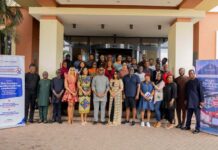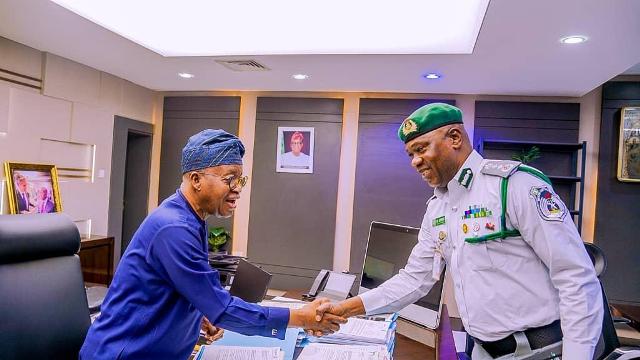Ime Akpan
A foursome comprising the minister of marine and blue economy, Mr Gboyega Oyetola, minister of transportation, Mr Said Alkali, comptroller general, Nigeria Customs Service (NCS), Mr Adewale Adeniyi, and managing director of the Nigerian Railway Corporation (NRC), Mr Fidet Okhiria met and resolved to phase out physical inspection of cargoes at the seaports
The resolution is contained in a statement jointly signed by the media aide to the minister of marine and blue economy, Nr Ismail Omipidan and the NCS spokesman, Mr Abdullahi Maiwada.
According to the statement, the decision was taken as part of efforts to ensure ports efficiency and competitiveness.
The meeting, which was held at the ministry of marine and blue economy and which had Okhiria attending virtually, also resolved to ensure a new construction that will bypass the fixed scanner at Apapa, so as to ensure the unhindered progression of scanning process during crucial infrastructure development.
They reasoned that the use of modern technologies like scanners was important to addressing the issue of ports congestion, so as to ensure efficiency and competitiveness.
Consequently, the comptroller of customs was charged to enforce the use of scanners at the ports, just as they encouraged private investors to come in and invest in the deployment and maintenance of scanners at the nation’s ports.
According to the statement, the meeting, which was held at the ministry of Marine and Blue Economy and which had the Managing Director of Nigerian Railway Corporation (NRC), Fidet Okhiria attending virtually, also resolved to ensure a new construction that will bypass the fixed scanner at Apapa, so as to ensure the unhindered progression of scanning process during crucial infrastructure development.
“The primary thrust of this collaborative venture was to deliberate and actualise initiatives that would not only open up ports but also foster seamless cooperation and trade and facilitation.
“A key focal point of discussion was the strategic integration of the non-intrusive inspection technology (NIIT) to bolster operational efficiency in Nigerian seaports.
Acknowledging the pivotal role of NIIT in actively decongesting ports, the meeting entrusted the comptroller general of customs with the mandate to champion and prioritise cargo scanning over traditional physical examination methods,” the statement said.
Besides, immediate action was endorsed to rectify and optimise all existing scanners at prominent ports such as Apapa, Tincan Island, Onne, and PTML.
“Simultaneously, the existing mobile scanners will be strategically deployed to facilitate expeditious cargo inspections,” it added.
For its part, the NRC pledged continued commitment to freight cargoes to inland container depots/dry ports, a strategic move to alleviate congestion at major ports.
The corporation said plans were unveiled for the efficient evacuation of containers from Port Harcourt to Aba, with future extensions envisaged for Onne Port.
The NRC also concurred on a pragmatic approach by agreeing to bypass the fixed scanner at Apapa to ensure “unhindered progression of scanning process during crucial infrastructure development.
The meeting also advocated for exploring public-private partnerships to oversee the installation and maintenance of scanning technology.
“The collaborative model, according to the statement “aims to sustain efficiency and foster innovation in cargo inspection processes.”























































